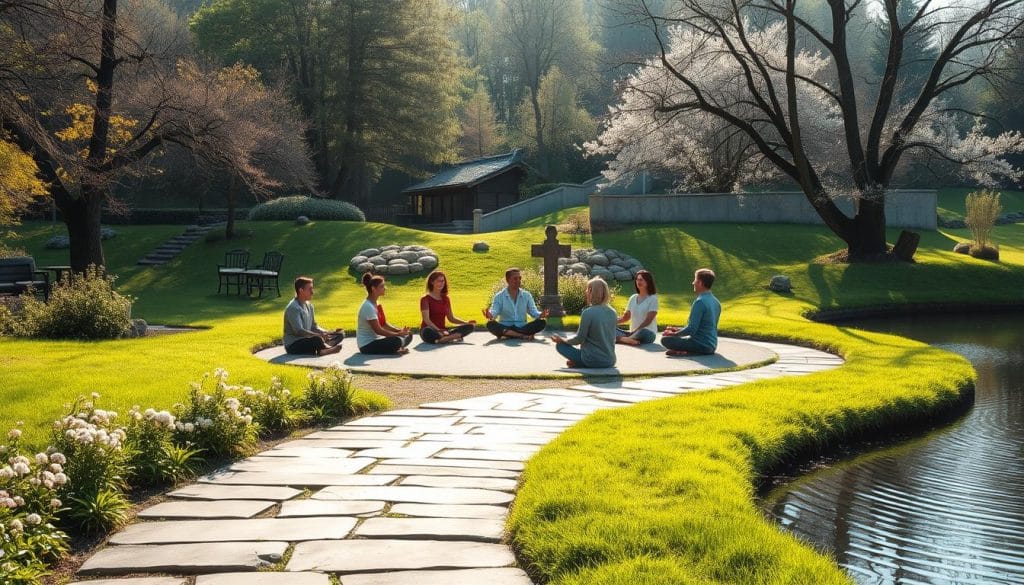Have you ever felt a deep longing for something more? A yearning to connect with something greater than yourself? If so, you’re not alone. Millions of people worldwide are on a journey to build a strong spiritual foundation in their lives. This guide is here to help you start that journey of self-discovery and fulfillment.
Imagine a world where you feel grounded, centered, and at peace. That’s the power of a solid spiritual foundation. It’s not about following a specific religion or belief system. It’s about building a personal relationship with the divine, the universe, or whatever you call that higher power. Let’s explore the essential steps to build this transformative connection together.
Key Takeaways
- Understand the importance of spirituality in personal growth and well-being.
- Discover how to identify and align your core beliefs with your values.
- Learn practical techniques for incorporating meditation and mindfulness into your daily life.
- Explore the spiritual lessons that can be found in nature and the great outdoors.
- Discover the benefits of building a supportive spiritual community.
Understanding Spiritual Foundations
Spirituality is a personal and complex idea. It’s about searching for meaning, purpose, and connection to something bigger than us. As we seek spiritual wellness and finding purpose and meaning, knowing the basics is key.
Defining Spirituality
Many think spirituality only means religion, but it’s more than that. Some find it in religious practices, while others connect with nature or meditation. Spirituality is about personal beliefs, values, and experiences.
The Importance of Spirituality in Life
Practicing spirituality can greatly improve our well-being. It helps us find purpose, understand ourselves better, and stay strong emotionally and mentally. A strong spiritual base also gives us a sense of belonging and community, especially in tough times.
How Spiritual Foundations Vary by Culture
Our view of spirituality is shaped by our culture and society. Around the world, cultures have their own spiritual traditions and beliefs. Learning about these can widen our views and help us appreciate the diversity of human spirituality.
“Spirituality is not about being perfect. It’s about being present, connected, and finding meaning in our lives.” – Anonymous
Identifying Your Core Beliefs
Discovering your core beliefs is key to building a strong spiritual base. By doing a personal belief check, you learn more about yourself. This helps you match your beliefs with your values, creating a true sense of faith and belief systems.
Performing a Belief Inventory
Begin by thinking about the beliefs that shape your view of the world. Reflect on your life’s purpose and your connection to the divine. Ask yourself, “What do I really believe about reality?” or “What guides my choices?” Write down your thoughts, exploring your deepest beliefs without fear of judgment.
Aligning Beliefs with Values
- Look at how your beliefs match your values. Do they go hand in hand, or are there gaps?
- Find out which beliefs uplift you and which ones hold you back. Think about which ones help you grow and which need a rethink.
- Work on self-awareness by fixing any mismatches between your beliefs and values.
The Role of Trust in Spirituality
Building a solid spiritual base means trusting the journey. Trust is key to embracing the unknown and letting your beliefs grow. An open and curious spirit allows for personal growth and change. Trusting yourself and the universe helps you deal with the ups and downs of faith and belief systems more smoothly.
“The foundation of spiritual life is self-knowledge, and the foundation of self-knowledge is honesty.” – Adyashanti
The Role of Meditation and Mindfulness
Meditation and mindfulness can change your life. They help you connect with the divine and find peace within. These ancient practices offer many benefits.
Benefits of Meditation
Meditation reduces stress and boosts focus. It improves your overall well-being. It helps you quiet your mind and understand yourself better.
It also makes you more emotionally strong. This way, you can face life’s challenges with ease and grace.
Simple Mindfulness Techniques
- Breath Awareness: Focus on your breath. Notice the sensations as you breathe in and out.
- Body Scan: Pay attention to your body parts. Notice any feelings or tension without judgment.
- Mantra Repetition: Repeat a meaningful word or phrase. This helps calm your mind.
Integrating Mindfulness into Daily Life
Meditation and mindfulness can change your daily life. They make you more present and connected. Even small moments of mindfulness can lead to big changes.
“Meditation is not a way of making your mind quiet. It is a way of entering into the quiet that is already there – buried under the ‘noise’ of compulsive thinking.” – Deepak Chopra

Start your journey with meditation and mindfulness. They offer deep spiritual benefits. By making them part of your life, you’ll find peace, clarity, and purpose.
Engaging with Nature
The natural world can teach us a lot about spiritual wellness and inner peace. By exploring nature’s beauty, we connect deeply with the divine and our true selves.
Nature as a Spiritual Teacher
Nature’s rhythms and cycles teach us about our spiritual journey. The seasons and sun remind us of life’s fleeting nature. They show us the need for balance and harmony in our lives.
Finding Sacred Spaces Outdoors
- Look for quiet, awe-inspiring places like mountains, forests, or lakeshores.
- Make a meditation spot in your backyard or park. Use rocks, plants, or water to enhance it.
- Try outdoor activities like hiking, gardening, or just sitting quietly to connect with nature.
By learning from nature and creating sacred outdoor spaces, we can grow spiritually. This enriches our lives in many ways.
“In every walk with nature one receives far more than he seeks.” – John Muir
Building a Community
Building a strong spiritual foundation is key for personal growth. But, it can be tough to do alone. That’s where spiritual communities come in.
Importance of Spiritual Communities
Being around people who share your spiritual views can be incredibly uplifting. These groups offer a safe place to explore and deepen your faith. You can learn from others, gain new insights, and find the support you need.
Ways to Connect with Like-minded Individuals
Finding a spiritual community is easier than you think. Here are some ways to meet others who share your spiritual interests:
- Attend local spiritual or meditation gatherings, workshops, or classes.
- Join online forums, discussion groups, or social media communities focused on spiritual topics.
- Volunteer or participate in activities organized by spiritual organizations or centers.
- Reach out to local spiritual leaders or mentors and inquire about community events or gatherings.
- Engage with spiritual authors, teachers, or influencers and connect with their followers.
By actively seeking out and engaging with a supportive spiritual community, you can enhance your spiritual growth and personal development. This will enrich your overall well-being and fulfillment.

Remember, spiritual growth is not a solo journey. Embrace the power of community. Let it guide you towards a deeper, more meaningful connection with yourself and the world.
Exploring Religious Traditions
Exploring the world of faith and belief systems can change your life. It opens up new views and makes your spiritual journey richer. We’ll look at the teachings of major world religions and find insights to strengthen your spiritual base.
Major World Religions and Their Teachings
The world’s religions share ancient wisdom and profound insights. Let’s look at the core teachings of some key belief systems:
- Hinduism: Teaches the connection of all things, the concept of Brahman, and the path of dharma.
- Buddhism: Focuses on ending suffering through the Four Noble Truths and the Eightfold Path.
- Christianity: Centers on Jesus Christ’s teachings of love, forgiveness, and the path to salvation.
- Islam: Believes in one God (Allah) and follows the Quran and the Prophet Muhammad’s teachings.
- Judaism: Based on the covenant with God, the Torah, and following mitzvot (commandments).
Learning from Different Spiritual Practices
Each religion has its own teachings and practices. Yet, we can learn a lot by exploring different spiritual traditions. With an open mind and curiosity, you can find universal truths and add powerful practices to your faith and belief systems and spiritual wellness journey.
| Spiritual Practice | Potential Benefits |
|---|---|
| Contemplative Prayer (Christianity) | Cultivates inner stillness, connection with the divine, and increased self-awareness. |
| Yoga and Meditation (Hinduism/Buddhism) | Promotes physical, mental, and emotional well-being, and enhances mindfulness. |
| Chanting and Mantra Recitation (Hinduism/Buddhism) | Induces a state of focus, calm, and spiritual resonance. |
| Pilgrimage and Sacred Site Visits (Various Traditions) | Fosters a sense of reverence, connection with the divine, and personal transformation. |
By adding diverse spiritual practices to your life, you can deepen your understanding of the divine. This can lead to inner peace and improve your overall spiritual wellness.
“The diversity of the world’s religions is a reflection of the divine’s infinite manifestations, each offering unique pathways to the same timeless truths.” – Anonymous
The Power of Rituals
Rituals are very important for spiritual growth and finding purpose. They help us connect with the divine, find meaning, and live more mindfully. Exploring rituals shows how they can deeply shape our spiritual path.
Creating Personal Rituals
Making personal rituals is a personal and deep process. It’s about thinking about our values, desires, and where we want more purpose. By making rituals that match our spiritual needs, we nourish our souls and find fulfillment.
- Start by thinking about what parts of your life you want to make more spiritual.
- Try different things like candles, incense, music, or movements to find what feels right.
- Add symbols, affirmations, or visualizations that fit your beliefs and goals.
- Make sure to do your ritual at the same time and place, so it becomes a special part of your life.
The Significance of Celebrations in Spirituality
Celebrations are key in the spiritual world. They help us honor life’s cycles, show gratitude, and connect with the divine. Celebrating holidays, seasons, or personal achievements helps us grow spiritually and find purpose.
| Celebration | Spiritual Significance |
|---|---|
| Winter Solstice | Honoring the return of light and the cycle of renewal |
| Equinoxes | Celebrating the balance between light and dark, day and night |
| Birthdays | Acknowledging personal growth and the sacredness of life |
By joining in and honoring these celebrations, we show respect for life’s rhythm and our role in it. This helps us grow spiritually and find purpose.
“Rituals are the formulas by which harmony is restored.” – Maya Angelou
Journaling for Spiritual Growth
Journaling is a powerful tool for spiritual growth. It lets you explore your thoughts and feelings. This way, you can learn more about yourself and connect with your inner self.
Suggested Journaling Prompts
Here are some prompts to get you started:
- What does spirituality mean to you, and how has it evolved over time?
- Describe a recent spiritual experience or moment of connection with the divine.
- What are your core values, and how do they guide your decisions and actions?
- What challenges have you faced in your spiritual growth, and how have you overcome them?
- How can you incorporate more mindfulness and gratitude into your daily life?
Reflecting on Your Spiritual Journey
Reflect on your spiritual journey as you journal. Think about the good times and the tough ones. This reflection can help you grow and understand yourself better.
“The purpose of a spiritual journey is not to arrive at a destination, but to discover the journey itself.”
Let journaling guide you on a fulfilling spiritual path. The insights you gain will improve your personal growth and well-being.
Seeking Guidance and Mentorship
Exploring the spiritual path can be a personal and deep journey. Getting guidance and mentorship can be very helpful. A spiritual mentor can offer insights, wisdom, and support. This can help you grow in spiritual wellness and personal development.
Finding a Spiritual Mentor
Finding the right spiritual mentor is rewarding. Look for someone who knows their spiritual practices well. They should be ready to share their knowledge and experiences.
Attend local spiritual events, workshops, or retreats to meet mentors. You can also ask friends or search online for mentors who match your spiritual goals.
The Benefits of Spiritual Guidance
Having a spiritual mentor brings many benefits. They can give you a new view, question your beliefs, and guide you through your spiritual journey. A mentor can also support and encourage you, helping you stay on track.
They might also introduce you to new practices and resources. This can help you understand more and improve your spiritual wellness.
“A good mentor can be a powerful catalyst for personal transformation and spiritual awakening.”
Seeking guidance and mentorship is a key step in your personal development and spiritual growth. With a trusted mentor, you can discover new views, grow in self-awareness, and live a more fulfilling spiritual life.
Overcoming Obstacles to Spiritual Growth
Starting a spiritual journey is rewarding but comes with challenges. Keeping up with spiritual practices and finding inner peace can be tough. Yet, with the right mindset and strategies, you can beat these obstacles and keep growing spiritually.
Common Challenges to Spiritual Practices
Modern life is busy and demanding, making it hard to find time for meditation or nature. Doubts, fears, and lack of discipline also slow us down. These hurdles can make it hard to keep moving forward.
Strategies for Resilience and Growth
To overcome these obstacles, be patient, persistent, and open to change. Here are some tips to help you stay strong and keep growing spiritually:
- Make time for your spiritual practices every day, even if it’s just a few minutes.
- Join a spiritual community or find a mentor for support and guidance.
- See setbacks as chances to learn and grow, and don’t be too hard on yourself.
- Reflect on your inner peace and progress regularly to stay motivated.
- Try different spiritual practices to find what works best for you as your needs change.
By being flexible, kind to yourself, and committed to growth, you can face challenges head-on. This way, you can deepen your connection with the sacred and the divine within.
Making Spirituality a Daily Practice
Building a strong spiritual foundation starts with daily practice. Simple yet powerful exercises can deepen your connection with the divine. They bring peace, clarity, and purpose to your life.
Daily Exercises for Spiritual Connection
Begin your day with meditation or mindfulness. A 5-minute breathing exercise or a guided visualization can center you. Also, try rituals like gratitude journaling or spending time in nature to enhance your spiritual awareness.
Tips for Staying Committed to Your Spiritual Journey
Be flexible and open to new spiritual practices. Find what works best for you and stick to it. But, don’t hesitate to change your approach as you grow. Surround yourself with supportive people and seek guidance from mentors.
